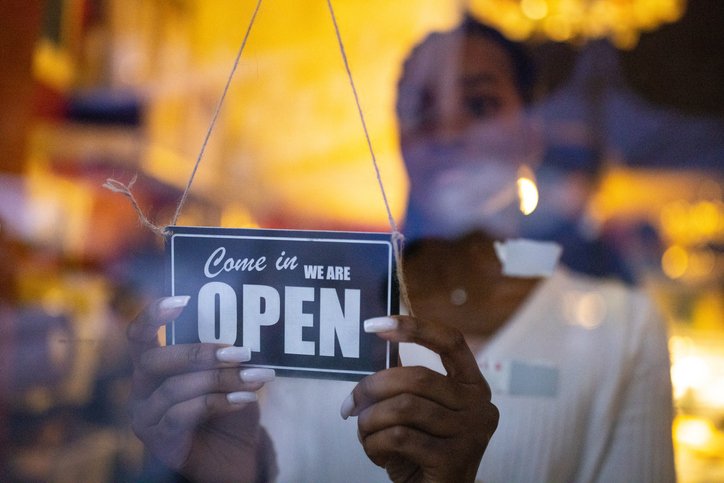
August is designated as Black Business Month. It is a time to celebrate, acknowledge, and uplift Black business owners. According to statistics, 10% of all businesses in the U.S. are Black-owned and 30% of all minority businesses are Black-owned. And since the pandemic started there has been a 30% rise in Black business ownership despite only 29% of Black business owners receiving government support during the COVID crisis, versus 60% of white business owners. Black women are the major reason for this surge. They are the fastest growing group of entrepreneurs in this country! In 2021, Black women represented 42% of new women-owned businesses.
Since the pandemic started there has been a 30% rise in Black business ownership, despite only 29% of Black business owners receiving government support vs 60% of white business owners. Black women are the reason for this surge. Click To TweetIn as much as I love to see these statistics, being a firm believer that entrepreneurship is the path to Black liberation, I know that we as Black women are still at the bottom of the small business revenue ladder. Black women who start their own business see an average of $24,000 in revenue in the first 5 years compared to $142,000 for all women-owned businesses. According to a Brookings report, all Black businesses bring in an average of just over $1 million in annual revenues compared to almost $6.5 million for non-Black businesses. Black businesses continue to struggle with persistent systemic racism which denies us equal opportunity to access the resources needed to start, grow, and sustain profitable businesses.
Black businesses continue to struggle with persistent systemic racism which denies us equal opportunity to access the resources needed to start, grow, and sustain profitable businesses. Click To TweetDespite the disproportionate challenges as a Black entrepreneur, I am proud that The Winters Group, Inc., has been able to persevere and thrive over our 38 years in business. I started the company in my basement on March 16, 1984. It was not the norm at that time — it was so unusual that the local paper ran a story on my foray into entrepreneurship entitled, “Woman starts business in her basement.” My main impetus for starting The Winters Group was to leave a toxic corporate environment. Disturbingly, studies show that many Black women are starting their own businesses today for the same reasons that I started mine: microaggressions (e.g., “you should straighten your hair,” “you are so articulate”), being passed over for opportunities by less-qualified white men, and unwanted sexual advances. I talk about these experiences in my book, Black Fatigue: How Racism Erodes the Mind, Body and Spirit. Specifically, in “Chapter 3: Then Is Now,” I highlight statistics that show that by most socioeconomic indicators the disparities are the same or even worse today. In “Chapter 6: Say Her Name: Black Women’s Fatigue,” I recount workplace stories about myself and others. According to reports by Lean In and McKinsey & Company, Black women have the worst outcomes in the workplace.
And we have the worst outcomes relative to sustaining our own businesses. Eighty percent of Black-owned businesses fail in the first year primarily due to the lack of access to capital. This is compared to a failure rate of 20% for all small businesses. Most Black-owned businesses rely on their own funds to start their businesses.
I learned early on that banks and government funding lend to people with proven track records. Loans go to people who already have money or access to it. Many white start-ups take advantage of more ready access to capital, as well as intergenerational wealth. Many Black people, myself included, had no such options. It is undisputable that Black entrepreneurs have a more difficult time securing funding. According to the Federal Reserve, 80.2% of white business owners receive at least a percentage of the funding they request from a bank, compared to 66.4% of BIPOC business owners. After being rejected for small business loans and lines of credit several times in the early years, I stopped putting my energy there and grew the business more slowly by reinvesting the profits. Even now as a well-established profitable business with no debt, it recently took nine months to get a personally guaranteed line of credit from a major financial institution. We did not get the full amount that we requested, which was a reasonable percentage of our receivables according to our accountant.
Since the racial reckoning of 2020, more lending institutions are acknowledging their complicity with inequitable practices that have harmed Black business owners for centuries. They realize that criteria like credit history, minimum balances, and number of years in business disproportionately harm BIPOC applicants as a result of historic systemic racism. It is also well-researched that when Black-owned businesses are successful in securing funding, we are subjected to higher interest rates. According to a report from the Minority Business Development Agency, from 2006-2020, BIPOC firms paid 7.8% in interest on average for loans, compared with 6.4% for white firms.
Lending institutions are acknowledging their complicity with inequitable practices that have harmed Black businesses. Criteria like credit history, minimum balances, and number of years in business disproportionately harm BIPOC… Click To TweetSeven of the largest financial institutions pledged to support Black entrepreneurship after the murder of George Floyd in 2020. The jury is still out as to whether we will see systemic change as a result. I have yet to see it. The Winters Group applied for the line of credit that I reference above in 2021 and we experienced the same, if not a greater, level of scrutiny as 30 years ago — nine months worth! These types of experiences are frustrating and contribute to Black Fatigue.
What can we do?
- Continue to hold lenders accountable to the pledges they made to support Black entrepreneurs.
- When seeking funding, be armed with the data on racial inequities in lending and don’t be afraid to use it.
- Ask questions of lenders like, “Is this a requirement for all applicants?”
- Call out inequitable situations. We were ready to take our grievance over the inordinate amount of time to be approved for the line of credit to the CEO of the bank. With this threat, the process moved faster. (We should have done it sooner!)
- Intentionally and unapologetically patronize Black-owned businesses. The reason I include “unapologetically” is because I had had the experience of other Black people in large organizations with the power to hire The Winters Group tell me that they could not hire us because it would look like they were giving preferential treatment to a Black company. The “optics” would not be right.
From the lending side, lenders should:
- Train loan officers (decision makers) about historic racism and unconscious bias.
- Conduct regular audits to determine the proportion of loans that are denied to Black applicants and interrogate why.
In the end, the rewards of owning my own company far outweigh the challenges. I have no regrets. And it warms my heart that so many Black women today are leaving environments that do not value and respect them and are forging their own paths — to be in control of their own destiny. This is power. Congratulations to all Black entrepreneurs!
It warms my heart that so many Black women today are leaving environments that do not value and respect them and are forging their own paths — to be in control of their own destiny. This is power. Click To Tweet

















